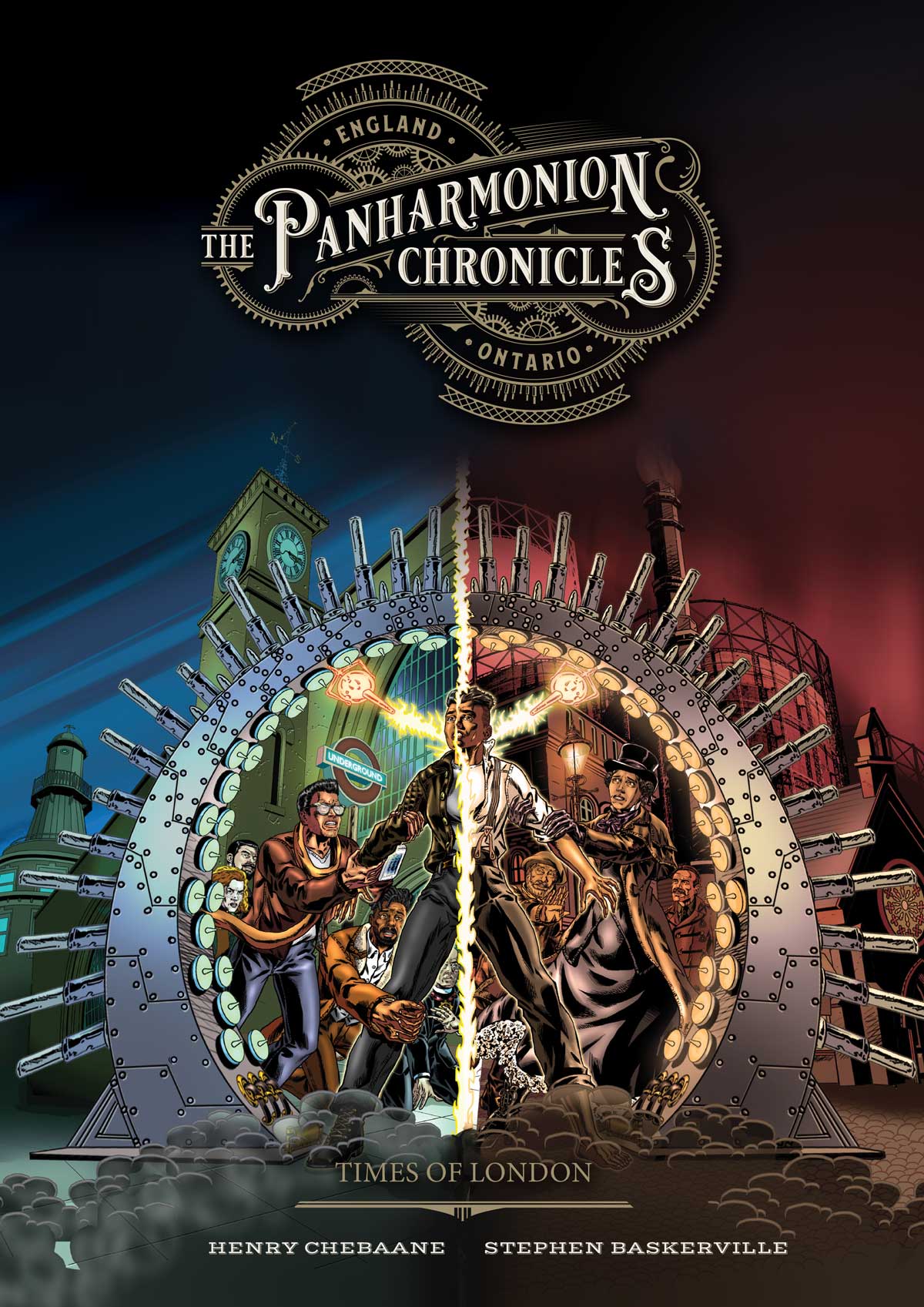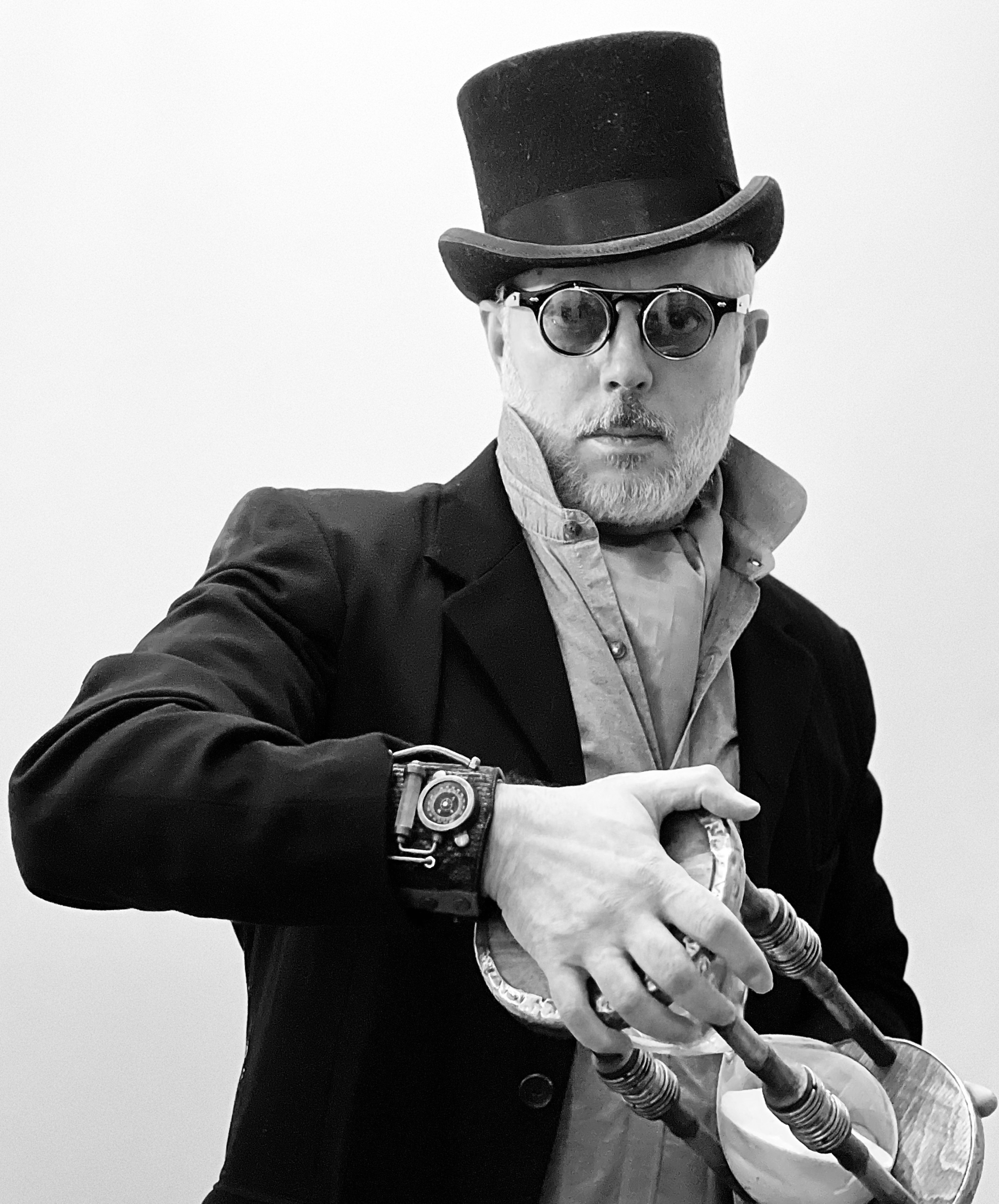The Panharmonion Chronicles is a gritty thriller trilogy that grapples with the nature of time, reality and identity. The heady blend of science-fiction, horror and alternative history also includes some levity with hints of wry humour, pop culture and homage to music lovers of all genres.
The story follows Alex Campbell, who is a Canadian musician struggling with a conflicted identity, a tragic past and repressed supernatural abilities. She is a primed time-bomb in the making. Orphaned at a young age, life has never been easy and is about to get a lot worse. Following the inheritance of a decaying 19th century London house from a mysterious ancestor, she moves to Britain, hoping for a fresh start and a better future.
Soon, her renovation plans are being thwarted by agents of a shadowy corporation with ancient roots and a malevolent agenda. While fighting against their mounting hostility, Alex makes some shocking discoveries about her family and herself that alters her grip on reality…
The Panharmonion Chronicles is the debut novel of British writer and designer Henry Chebaane and has been illustrated by veteran British comic artist, Stephen Baskerville (Spider-Man, Transformers, Judge Dredd), with extra art pages by guest artists Michael Montenat (Hellraiser) and Fabio Jacomelli (Hachette) with colours by Vittorio Astone (These Savage shores).
The Panharmonion Chronicles will be introduced at this year’s Sci-Fi London film festival on Sunday 4 June (find out more here) and we sat down with Henry Chebaane (pictured above) to discuss the first book in the trilogy, Times Of London…
The story is set in both Canada and the UK, across two distinct time periods, what drew you to these times and places?
I have visited Canada multiple times for work, particularly Toronto and Montreal. From my first visit, I was struck by how much cultural legacy Britain and France have respectively left on each city and their region. What also surprised me is how much of this historical (and colonial) impact is still structurally present today.
This resonates with me because I’m both French and British. I have studied history through the optic of both cultures. These observations led me to compare this legacy with other parts of the world that I’m familiar with: USA, Africa, India, Australia and South-East Asia.
While European colonial endeavours span many centuries, the 19th century is a compelling period to me because the development of mechanisation and resources extraction produced an exponential growth in political and military power. This in turn had a compounding effect on scientific research and technology.
However, all this ‘progress’ did not translate into social, ethical, environmental and moral benefits for any species and populations. Quite the contrary. I would postulate that much of our post-modernist angst has its root cause in the 19th century failing to align technological progress with social benevolence.
So, I began a thought experiment: “what if…”knowledge” had been made widely available across all genders, all classes, all ethnicities, all nations?” What would our world look like today? What new problems would this create? In a quest to start answering some of these questions, The Panharmonion Chronicles came to my mind.
There’s a lot of alt-history blended with some real history that isn’t widely known about here in the UK. What kind of research did you do? Was it important to you to shed light on these more overlooked times in history?
Your question makes me realise how far back this research takes us. Perhaps, since I was able to read, then travel the world. But to keep the answer simple, let’s stay on the last few years. I’ve bought dozens of books focussing on various aspects of the 19th century, trawled the British library archives, and visited many locations myself. I’ve also lived in Scotland for three years and I am very fond of Edinburgh, so that part was straightforward.
To know more about Canada and its first nations, before starting on the first script, I had completed two on-line courses, which I would recommend to anyone interested in such matters. One is “Aboriginal worldviews and Education” from the University of Toronto, the other is “Indigenous Canada” from the University of Alberta. Both courses are taught by indigenous educators and the interactions are as insightful as the curricula themselves.
We, humans, use history to tell a story about ourselves. To make sense of who we are, individually and as a society. This ‘history’ is often revised, altered and edited to suit political agenda and consolidate power structures. It is also often altered to confirm world views and cognitive biases that we might have acquired through generations.
I think this human trait is shared by everyone on the planet. It’s not just a “European issue”. Every society has its origin stories, foes (real or imagined), heroes, rituals and mythos. That’s why we find storytelling so intrinsic to whom we are as a species. I would posit that we, apes, are more “imagining” than “thinking” beings.
So, as a thought experiment, I found it useful to blur boundaries between “official” history and imagined alternatives. This can create all sorts of questions within the reader’s mind and hopefully some insight might come from it.
If any, what (or who) was the inspiration for the main character of Alex? She’s a very unique heroine!
Alex is unique. And ubiquitous. There is a part of her in each human who lives today and has ever lived. For me and hopefully for many readers, Alex is the archetypal hero. She also symbolises our individual and shared reality: multiple, complex, confusing. I wish to let each reader to extrapolate further but through her there is certainly a lot to think about what it means to be “someone from somewhere”. Does it even mean anything?
The story is incredibly layered and each peel-back reveals a whole new aspect to the mystery at its core. How did you go about planning the series and do you know the ending yet?
Thank you for commenting on this. This story is my own attempt at making sense of who we are and choose to be as humans. The layers are multiple, because nothing in life is “black or white” and “reality” itself is only the perception we have of it, through our rather limited human bandwidth.
I’m an avid student of Quantum Physics because it helps me navigate the frustrations of daily life and see wonders in the mundane. It has also tremendously raised my awareness of the multitude of probable causes and effects about any observation I make about anything.
I wrote the outline of the story first as a novella, when taking online courses with University of East Anglia on fiction writing. Then, I tried it as a film script, and a TV pilot. Finally, I settled on the graphic novel medium because this was the most satisfying way to manifest this complex world and, hopefully, give the audience the pace to unpack the layers of meanings.
I’ve planned the story as a trilogy to give readers a first arc, but like all epic saga it can continue for a long time to come, exploring the many facets, characters and nations of this world.

What would you say were your biggest influences in creating the aesthetic of the world, both the 1800s and modern London?
I’m also a professional interior designer. Serendipitously, while I was researching the novel, I was also working in Kings Cross on the renovations of two boutique hotels. I spent months investigating the industrial past of the area. By some strange mental juxtaposition, both creative processes started to blend into each other. So, now readers have the unique opportunity to be able see features in the book that can also be visited around Camden.
Music and sound plays a pivotal role in the story. Is there anyone you were particularly listening to while writing? Anyone we should tune into?
Personally, I have such a wide range of musical tastes that I could not isolate one. So, this book is dedicated to all music makers and lovers on the planet. If I was to choose one type, though, it would be electronica. I just truly love it in all its forms, from early Chicago House and Detroit Techno to European Trance and Balearic Chill.
During the three years, while writing this book, I mostly listened to the entire catalogue of Carbon-Based Lifeforms and Solar Fields when outlining. While writing action sequences I would listen to Markus Schulz, Tritonal, Cosmic Gate and some folk/dark metal acts like Saor and Dzö–nga.
While writing the book, I also wrote a few songs and produced tracks released under alias “LX8”. It’s the same alias as used by Alex in the story. It’s just a creative experiment to see if I could manifest her presence outside the book, in the “real” world.
The plot seems to hinge on a unique scientific technological idea about the properties of sound and matter. Did you do much research into this at all? Do you think this could be possible?
Yes, in some form or another. From my understanding of the quantum nature of our universe everything is wave or particle, a field of probability that “collapses” into one state, one location, when “observed” or interacted with.
Sound is “perception”. It requires an “observer: our individual physiological response to vibrations of air molecules, skin, bones, synapses and so on.
Music is a kind of mathematical “language”, a progressive and recursive geometry that produces energy in motion (emotion) and the strangest of responses in all beings. Not just humans. Just ask my dogs. So, who knows what else music could do?
This is very much book one. What can we expect from the rest of the series?
Much more action, drama, blood, twists, insights and revelations.
If any, who are your literary and artistic inspirations and how would you say they have influenced the book?
How long do we have? Ok let’s make it short: H.G.Wells and Jules Verne in 19th century writing, Philip K. Dick and Ray Bradbury in 20th century writing, Christopher Nolan, James Cameron and Ridley Scott in film-making. I’m indebted to them and many more, for creating works that inspire me every day.
When will the next book in the series be released?
It’s already been written. The illustration process is a lengthy one because of the detail I write into each panel. I will have a better idea at the end of the year. I intend to also explore the world of The Panharmonion Chronicles in Games and other media. So, stay tuned.
The Panharmonion Chronicles will be introduced at this year’s Sci-Fi London film festival on Sunday 4 June, with Henry Chebaane in attendance. Find out more here.
